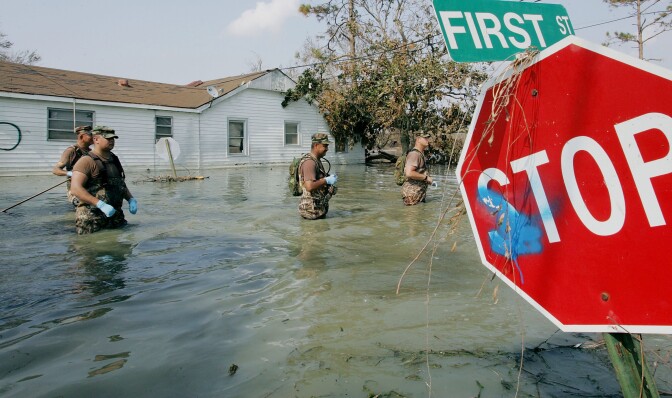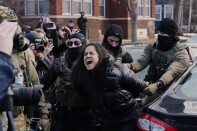This story is free to read because readers choose to support LAist. If you find value in independent local reporting, make a donation to power our newsroom today.
Trump's use of National Guard strays from role as 'minutemen,' military experts say

Pruning trees, collecting trash, patrolling neighborhoods. These are some of the ways the National Guard has been deployed in recent weeks.
In his second term, President Donald Trump has increasingly sought the use of the Guard — specifically in Democratic-led cities — to address crime, quell protests and support ICE operations.
In Washington, D.C., where Guard members have been deployed since August, they have largely patrolled the capital's streets and taken part in beautification projects. The U.S. Army said troops had cleared 1,142 bags of trash, spread 1,045 cubic yards of mulch, pruned 400 trees, cleared 7.9 miles of roadway, painted 270 feet of fencing and packaged 6,030 pounds of food as of Oct. 1.
The Trump administration has also pushed to deploy troops in Oregon and Illinois to safeguard ICE facilities and personnel. Meanwhile, in Missouri, a small group of Guard members have been called to assist ICE with "data entry, case management, and logistical support." As for Memphis, the Guard's role has yet to be seen, but the city government described their presence as serving as the "eyes and ears" for local law enforcement.
Last week, at a gathering of top U.S. military leaders at Quantico, Va., Trump thanked the Guard for helping make D.C. safer.
"I want to salute every service member who has helped us carry out this critical mission. It's really a very important mission," he said.
While these tasks have drawn attention, military experts say they stray from the Guard's core missions, like aiding those in need during natural disasters and other emergencies. They also worry how these new deployments will affect recruitment and public trust.
"It is a misuse of a great instrument," said Retired Maj. Gen. William Enyart, who led the Illinois National Guard from 2007 to 2012. He is also a former Democratic congressman.
The National Guard Bureau declined to comment.
Minutemen to the 2025 Texas floods
The Guard's roots stretch back to the 1600s — more than a century before the country's founding. At the time, colonies formed their own militias made up of citizen-soldiers.
These early forces were called "minutemen" because they were known to respond at a moment's notice and later inspired the creation of the Guard.
Today, a minuteman is featured on the Guard's seal and the spirit of a "minuteman" still rings true, according to Kevin Greene, the co-director of the Center for the Study of the National Guard at the University of Southern Mississippi.
"They have chosen to serve those who cannot or choose not to," he added. "And they do it out of a sense of duty and of providing help and security to their towns, cities, counties, states and nation."
While Guard members have been deployed overseas for military operations or sent to handle civil unrest at home — more often, they have answered the call during natural disasters and other emergencies, Greene added.
During the terrorist attacks on Sept. 11, 2001, Guard troops searched for survivors in the rubble and recovered the remains of fallen firefighters. In 2005, in the aftermath of Hurricane Katrina, the Air National Guard evacuated nearly 2,000 residents, as well as delivered food, water and medical supplies to those in need.

Guard members were also on the front lines of the COVID-19 pandemic — staffing emergency call centers, working at food banks and removing the dead from hospitals. More recently, in July, troops rescued over 520 people after devastating floods struck central Texas.
That adaptability is why the Guard is often compared to a "Swiss Army knife." But Maj. Gen. Enyart cautioned that just because they can and they will help with many things doesn't mean they should be taken advantage of.
" Soldiers like to have a useful mission," he said. "And they rely on the political leadership of this country to send them on missions that are necessary, that either defend this country or recover from a natural disaster."

Since Guard members serve part-time, Enyart also said he worried about how these deployments will disrupt their civilian jobs or education, or put a strain on loved ones.
"Not only is there that breach of trust with the soldier, but the families," he said.
Retired Maj. Gen. Randy Manner, former acting vice chief of the National Guard Bureau, said he's worried that these assignments will hurt recruitment — which has been going strong.
He's also concerned that the use of the Guard under the Trump administration will become more frequent and far-reaching.
" We must not allow this administration to drive a wedge between the American people and our military," he said.
Copyright 2025 NPR










